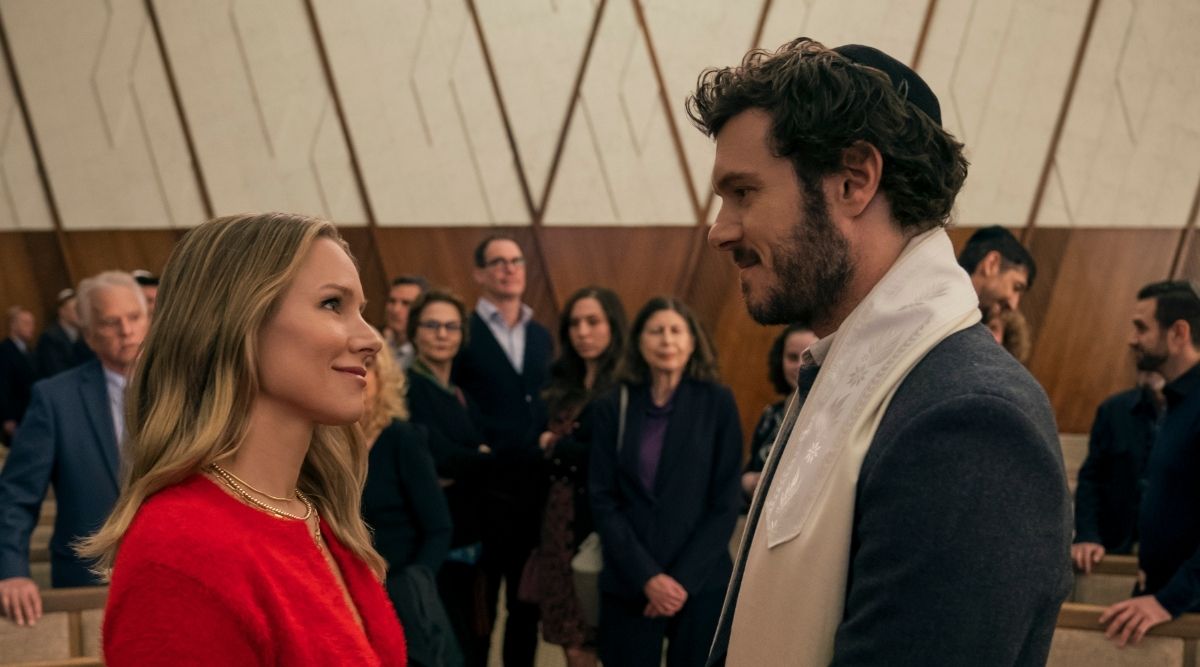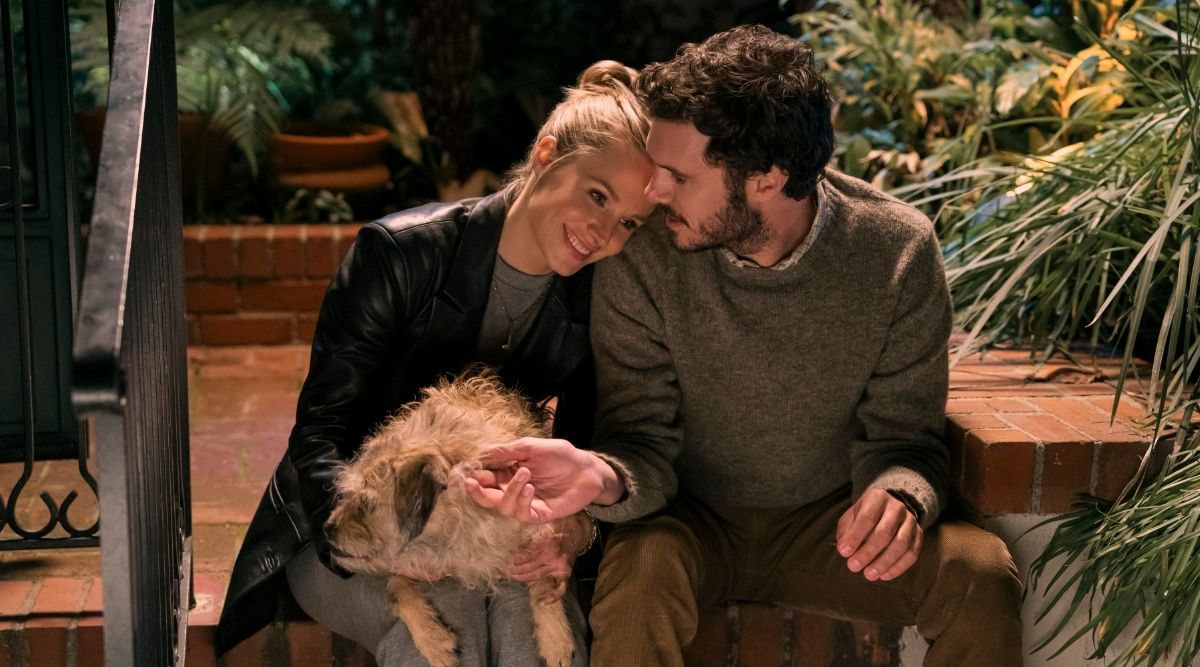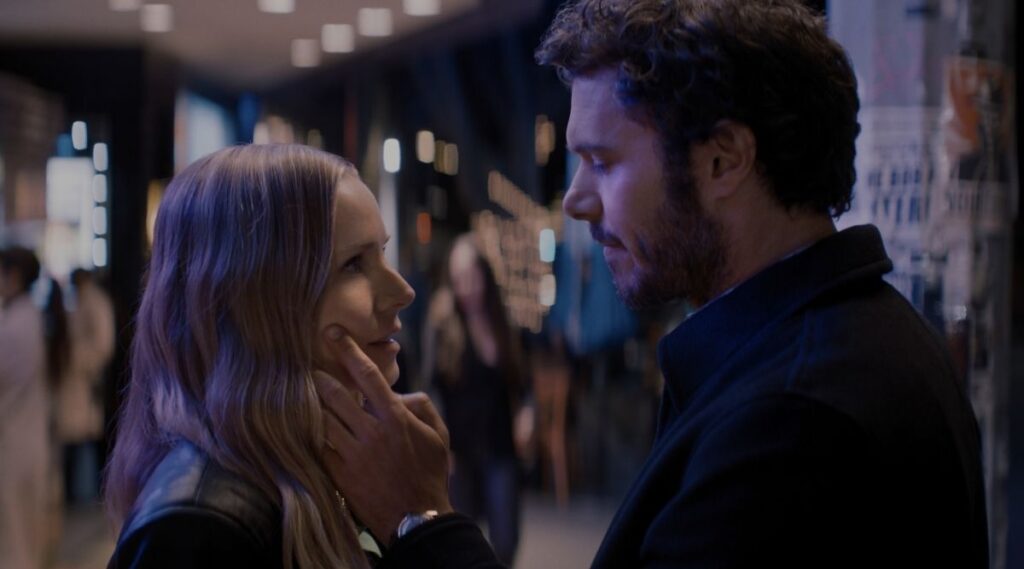“A rabbi and a podcaster walk into a bar” could easily be the start of a mediocre joke. Instead, it’s the start of a great new Netflix Original series by Erin Foster. Nobody Wants This is ten episodes of laughs after Rabbi Noah Raklov (Adam Brody) and s*x podcaster Joanne (Kristen Bell) meet at low points in their lives and fall in love. Of course, it’s not as simple as it sounds. Or as it should be. Noah just broke up with his almost-fiance Rebecca (Emily Arlook), which has royally upset his mother, Bina (Tovah Feldshuh), and ostracized his sister-in-law Esther (Jackie Tohn), who is Rebecca’s best friend. Not to mention the fact that Noah’s a rabbi and Joanne isn’t Jewish.
Putting aside the very specific complications Noah and Joanne go through on the show’s dramatic side, Nobody Wants This is gold from a comedy standpoint. It’s so funny. There’s a great connection between the two main characters, as well as among their siblings, Noah’s brother Sasha (Timothy Simons) and Joanne’s sister and podcast partner Morgan (Justine Lupe). Plenty of the appeal of this show is situational humor, which succeeds nearly at every turn. However, many extended dialogue scenes in each episode are written up with precise humor to catch exactly the Jewish comedy of a circumstance while completely nailing punchline after punchline.
Have you ever wondered what would happen if a rabbi ran into a major donor in a s*x shop? Well, wonder no longer and prepare to laugh hard about it. Noah is entirely charming and has a witty but kind retort for literally everything. He does have a rabbinic sense to him in the way he speaks and interacts with the world. And the way his calm gels with Joanne’s intensity is surprising, given they fall in love rather quickly.
It’s a little irksome how many times they seem to go through the same round after round of worrying that their relationship might not work, so one makes some assumptions, and it gets them upset until Noah swoops in with a sermon to fix everything. Seeing the rabbi with all his charisma is fun, but it would be nice if the roles were reversed more often.

The show’s side plots, especially whenever they involve Sasha or Morgan, or even more so both of them together, are just as fun as the main plot. They’re both the dumber, less respected siblings, and the situations this gets them into are very fun. This is mainly because they’re both totally self-aware. We’re only ever laughing with them, not at them.
Nobody Wants This is fun. As a Jewish professional who works hard to have a life outside of the synagogue myself, I can’t imagine a better depiction of just how hard that is. But while it perfectly portrays that struggle, Nobody Wants This has a big issue with making it seem like Noah’s experience of Judaism, Jewish families, and synagogues is every Jew’s experience. The show constantly describes things as if they’re facts instead of with the typical rabbinic caveat that different Jews have different opinions or experiences.
The worst example is how the show makes it seem like the taboo about Jews dating non-Jews, especially a rabbi, is a universally held belief. While the prayer books in his sanctuary suggest it is a Conservative synagogue, even among the Conservative denomination (an American sect of Judaism that has no relationship with political conservatism), the opinions demonstrated in Nobody Wants This as if are universal facts of Judaism are only held by some Jews. In fact, the Reform movement, the largest Jewish denomination in America, recently lifted its longstanding ban on ordaining clergy in interfaith relationships.
Nobody Wants This depicts an aggravatingly monolithic Judaism. It’s not just that it’s so matter-of-fact about what Judaism does and doesn’t say about a given subject. The show is so successful at feeling authentically Jewish that on the rare occasion that Noah pronounces a Hebrew word unmistakably incorrectly, it’s embarrassing. Almost as embarrassing as the way the show horribly mistreats its Jewish women.

Bina, Esther, and Rebecca are all depicted as such unbearable stereotypes. Bina is the kind of all-controlling mother who has to be right about everything and is wildly overprotective of her children. And worse, for most of the show, Esther is the cloying, meanspirited wife and mother whose primary characteristic is yelling at her husband and keeping him from having his own life.
Esther at least eventually gets to have her own brief journey, but Bina’s arrogance exists only to be a foil to Joanne’s niceness at all costs. Joanne’s parents, who regularly reoccur, are depicted as aloof, but you’re supposed to laugh at them. You’re just supposed to resent Noah’s parents. It’s unfair that in a show otherwise so good at letting Noah describe and practice Judaism in a real and grounded way, the three main Jewish women are instantly boiled down to nags. Jewish mothers and wives don’t need to be loud, annoying, and mean every single time.
None of these shortcomings are unforgivable by any means. Nobody Wants This generates enough goodwill to get past these disappointments and focus on what’s funny or charming about it all. A show that’s so dedicated to Jewish authenticity and representation just feels like it ought to know better than to have all of its Jewish women spend two episodes straight yelling “Shiksa” at Joanne. While not everybody feels this way, many consider the word an incredibly offensive term that brings more shame on the person using it than the non-Jewish woman they’re attempting to debase with it.
Alas, Nobody Wants This is still a very good show. It’s full of huge laughs and fantastic situations that appeal to the specific audience and, hopefully, the broad audience. Its side characters are almost more exciting than the main characters at times, but Noah and Joanne are ultimately a lot of fun to watch, even if their circular quarrel gets a little old eventually.
Nobody Wants This is streaming now, exclusively on Netflix.
Nobody Wants This
-
Rating - 7/107/10
TL;DR
Nobody Wants This is full of huge laughs and fantastic situations that appeal to the specific audience and, hopefully, the broad audience.





